It’s not that I think Tarsem Singh’s Self/less is a very good movie, it’s that I don’t think it’s anything like the awful movie it’s largely been painted as. It strikes me as a reasonably effective, enjoyable, slickly-made thriller with a sci-fi base — no more, no less. Oh, I suspect the folks who made the film might think it’s more than that, because it touches on such big issues as the nature of identity and questions of how the upper classes view the lower classes as expendable. Yes, it does touch on these things — touch being the operative word, since these elements are not explored in much depth, nor are they entirely persuasive in their conclusions. I suppose they get some credit merely for noticing these issues.
From my perspective, the biggest letdown comes from the fact that the film marks a decided comedown for filmmaker Tarsem Singh. Singh has proved too idiosyncratic — and not entirely in a good way — to develop much of a following. His masterpiece is The Fall (2006), and it seems likely to stay that way. Even so, his other films that I’ve seen — the only one I’ve missed is Immortals (2011) — have at least suggested a major visual stylist with a penchant for the fantastic. Self/less feels like work-for-hire. Specifically, it feels like a low-wattage De Palma knock-off — and there are times in it when Mr. De Palma’s split-screens would’ve come in handy. What Singh has made is an efficient movie from a slightly underdeveloped script. That’s fine. But it’s not what I want from Singh. I want over-the-top baroque overkill of the fairy tale variety.
The idea behind the film is solid enough without being exactly mind-blowing or even original. Ben Kingsley plays Damian, a thoroughly unlikable real estate developer. He’s kind of the ultimate one-percenter, caring for no one and only interested in his next big deal — and this is in spite of the fact that he’s dying of cancer. But a secretive company, headed up by the very shifty Albright (Matthew Goode), offers him a way to extend his life — by having his mind transferred into an artificially-created newer, healthy body. Yeah, it costs $250 million, but that’s chump change to Damian. This is basically brain-swapping 101 — something that at least dates back to 1936 and The Man Who Changed His Mind. It isn’t even very flashy brain-swapping — no pyrotechnics here, just a couple of MRI-looking contrivances, et voila. It’s actually pretty ho-hum.
Anyway, Damian dies as Ben Kingsley and rises as Ryan Reynolds. Everything is hunky-dory, right? Well, no, because … it wouldn’t be much of a movie if it was. The new Damian is prone to disturbing visions — something Albright dismisses as hallucinations and gives him medicine to correct. But Damian grows increasingly convinced the truth is being kept from him. I suppose I should note that what follows gets into the spoiler realm, but it happens so early in the proceedings that it hardly matters. Plus, if you’ve ever seen this kind of movie before, you know full well that this new body wasn’t artificially created, and those hallucinations are the original owner’s memories trying to get through. It’s basically a full-body Hands of Orlac — and it comes in mighty handy when things go action-thriller, since the original inhabitant was some kind of highly-skilled soldier.
This is all undeniably pretty silly — and it gets even more so as the plot gets more improbably convoluted — but it’s kind of fun silly. The various twists and turns aren’t all that surprising, but they work well enough to keep things going. And it’s fun just to watch every carefully planted clue bear fruit. Less successful is the idea that this is ultimately some kind of redemption story. The concept is fine, but it’s so undeveloped that it’s hard to buy. Taken at face value for what it is, Self/less is entertaining enough. It’s just nothing great. Rated PG-13 for sequences of violence, some sexuality, and language.



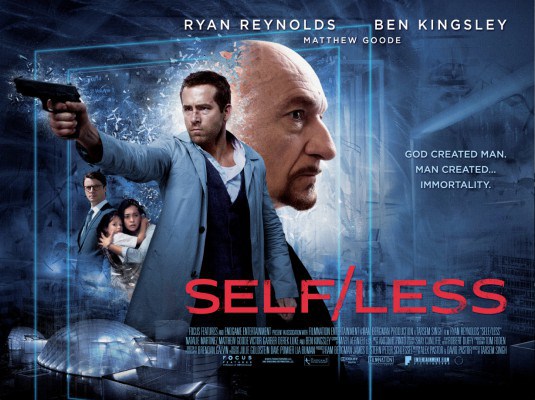
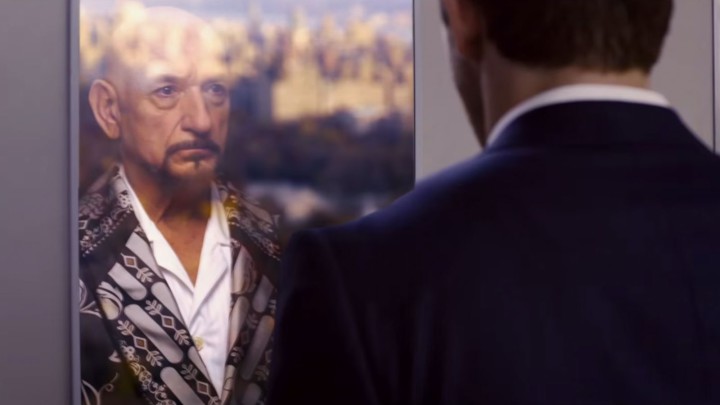
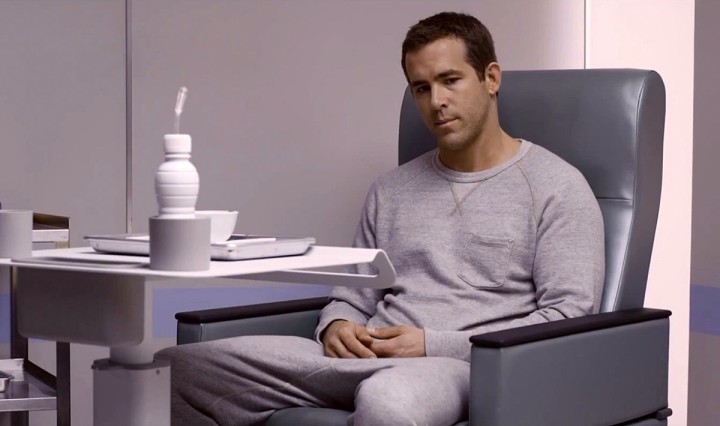
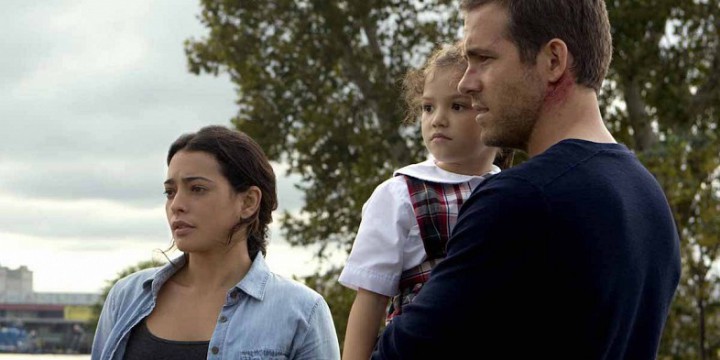
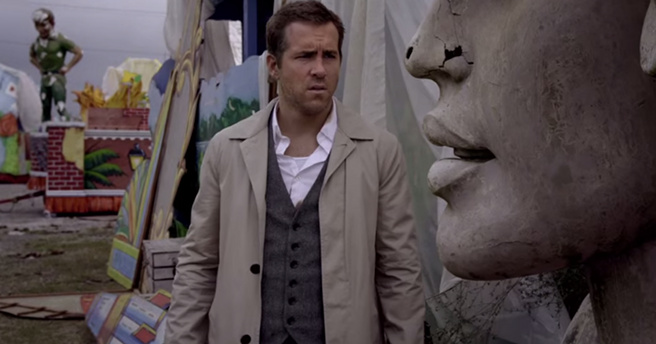
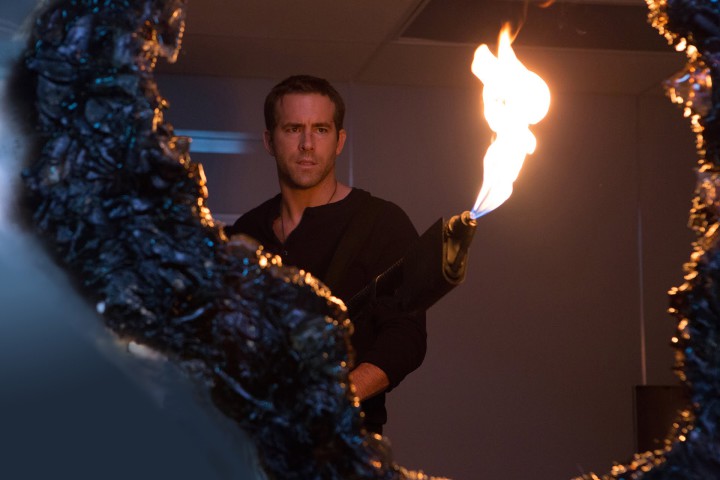
The quick editing and lively percussion in the montage where “Edward” tests out his new body reminds me of the montage in The Fall where the bandits receive their directions.
I suppose a case could be made, but making a case that this is anywhere near The Fall would be hard in general…
No, the production design and overall imagination aren’t really comparable to The Fall, but I see so much overlap in how these two montages are made that I can tell they’re from the same person. Are there similar sequences in Singh’s other films? These are the only two of his I’ve seen.
I think the child acting is better in Self/less.
I have no idea. You’ve just seen both films recently (if I recall). I have only seen the one that recently.
The child acting in Self/less is also less complex as a role is concerned. At the same time, I saw neither film for its child actors.
Yes, I just finished The Fall this morning.
Child acting wasn’t at the top of my reasons for watching, either, but I still found Jaynee-Lynne Kinchen’s work in Self/less to be one of the film’s assets and Catinca Untaru’s work in The Fall to be its main drawback. I agree that Untaru’s role is more complex but think that it was a mistake to ask so much from her.
Well, I think you need to factor in the extremely limited resources and odd background of The Fall. There are all sorts of reasons I’d say she works better than she has any right to. With the kid in Self/less the resources were undoubtedly greater. That you find her to be one of the film’s assets says a lot about the film.
I didn’t say she’s one of the film’s few assets. I found her to be a pleasant surprise, especially in the scene where Reynolds teaches her to swim. It seemed like they were having a casual, unscripted exchange, which may very well be the case.
I found her merely adequate.
Better or worse than THE CELL?
Much, much worse — but it’s years since I saw The Cell.